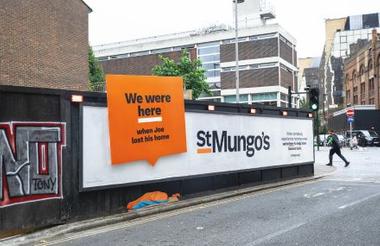Homelessness charity St Mungo’s has launched its first ever brand campaign to boost awareness of its services after saying that its public profile “was limiting its ambitions”.
Throughout September, the charity’s We’re Here campaign is being shown on billboards and bus stops across London.
Its campaign displays a range of images of homelessless at street level and narratives about people who have faced rough sleeping.
Georgina Day, assistant head of public engagement of the charity, said: “St Mungo’s has known for years that its public profile was limiting its ambitions.
“Now, a combination of the right timing, insight data and partner agencies Redstone and MediaLab, has made this brand campaign possible.
“Its focus on the positive action we take to end homelessness, with a simple message which is all about being there for our clients, is really true to us and what we want to be known for.”
The campaign is not directly asking for donations but the charity told Civil Society it expected to see an increase in income longer-term based on raised awareness.
‘A constant visible presence’
Helen James, head of projects and planning at Redstone, said: “St Mungo’s are a constant visible presence on the street – meeting and supporting people every day and every night.
“Redstone identified an opportunity to own this on-street presence through the campaign creative.
“The concept of being ‘here’ is central to the brand positioning and provides the perfect platform for the campaign – highlighting both the support St Mungo’s provides, but also helping position St Mungo's as the homelessness charity out there on the street.”
St Mungo’s, which would not disclose how much it had spent on the campaign, said its staff had seen more people rough sleeping over the past 18 months, including those in work or who had never been homeless before.
The charity reported that around 1,000 people sleep rough in London on any given night, reflecting a broader homelessness crisis in the UK.
According to data from the Ministry of Housing, Communities & Local Government, for the year to 31 March 2024, 117,450 households in England were in temporary accommodation, which is an increase of 12.3%.
Related articles












